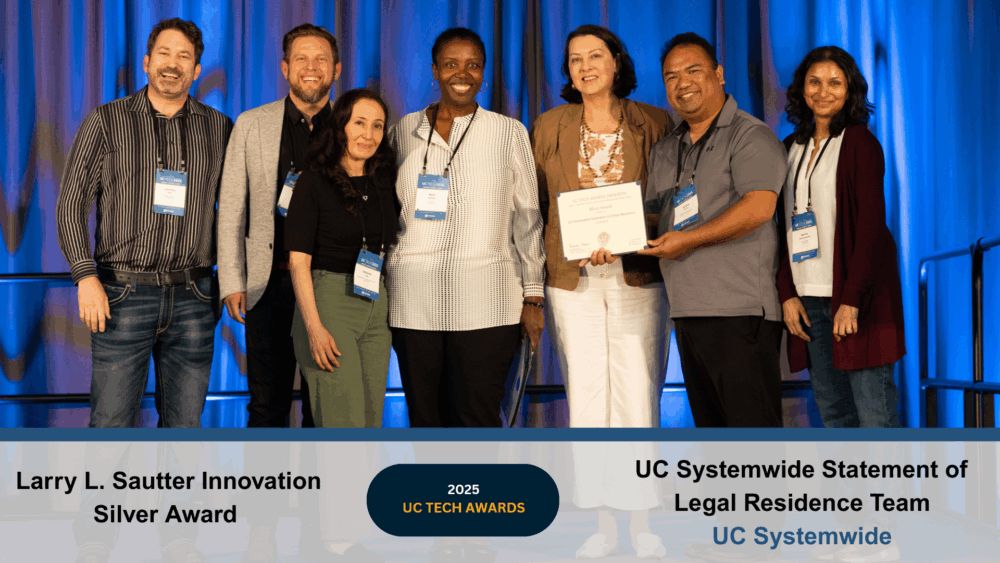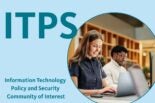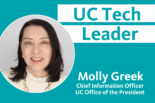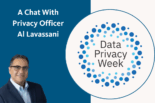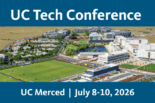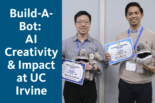Overview
The UC Systemwide Statement of Legal Residence (SSLR) team received the Silver Larry L. Sautter Award for Innovation in Information Technology at the 2025 UC Tech Awards. The SSLR team created a centralized, standardized, and user-friendly platform and process for student applicants to determine their residency for UC tuition purposes. This was an incredible team effort, requiring ingenuity, steadfastness, and genuine curiosity on
how to bridge policy, process, and service. The project has benefited thousands of students, not to mention the many hours saved in duplicative processes across the system.
The Challenge
A student’s tuition to attend a UC campus is tied to their California residence status per the UC Regents policy. Historically, an applicant would have estimated costs at admission time, but the costs weren’t confirmed until after the applicant committed to a UC campus. At that point, if the estimate was inaccurate, an applicant would have few college choice options since the information was not confirmed until the summer.
The Approach
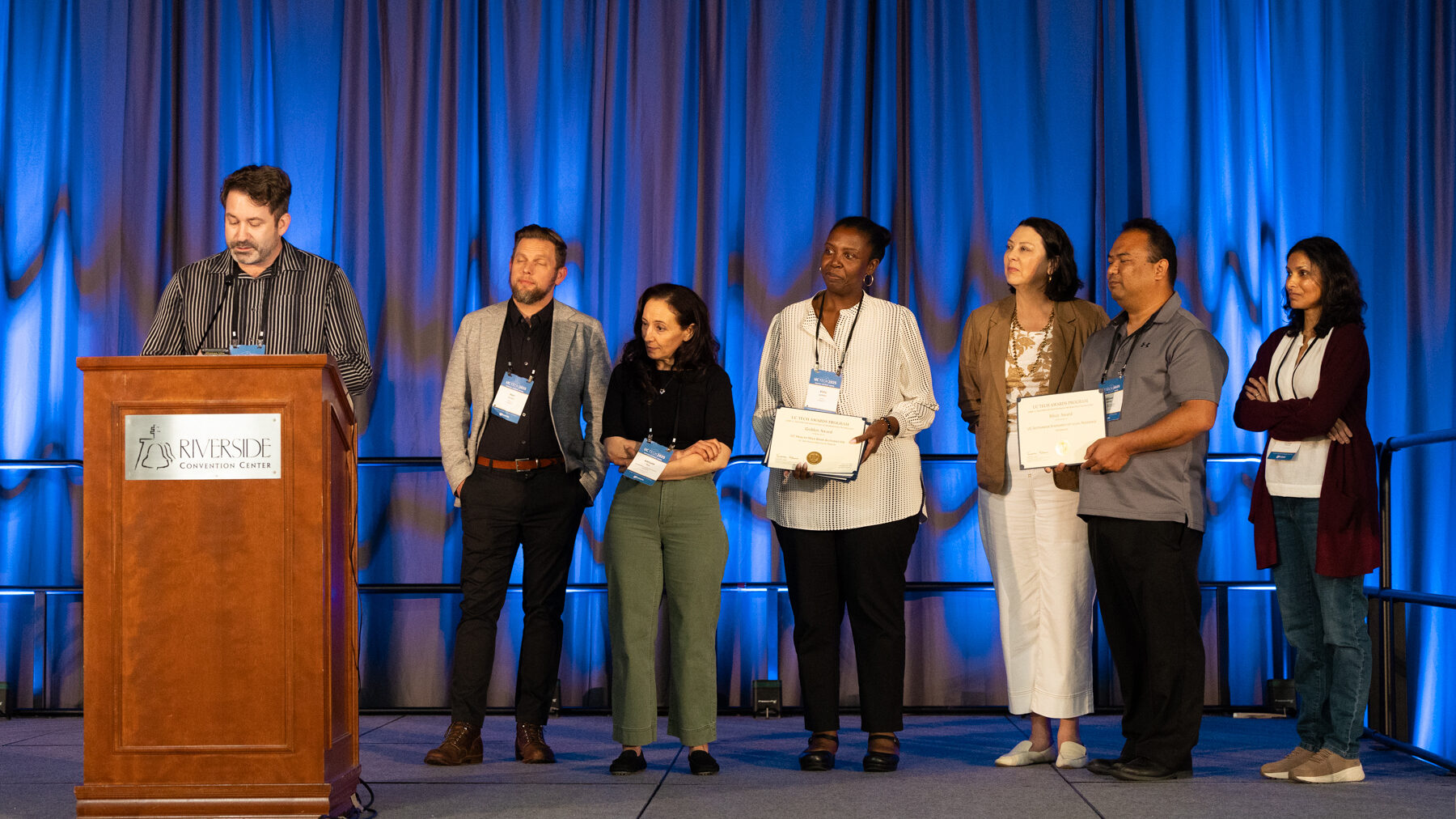
The UC Office of the President (UCOP) collaborated with stakeholders across the system to address the need for increased transparency on tuition costs for UC applicants at the time of admission. The project unfolded in two phases:
- Phase One: Modifications to the UC Application enabled automatic determinations for straightforward cases using a short questionnaire. This adjustment provided confirmed determinations for over 75% of applicants in the most recent admissions cycle. Starting in June 2023, the results took effect in fall 2023.
- Phase Two: Developing a new site application (SSLR) addressed applicants whose status couldn’t be determined through the initial UC application residence questionnaire. This site incorporated a comprehensive set of questions, allowed for document uploads, supported logic and business workflows, and contained a messaging system for applicants and staff.
Given the complexity of the UC Residence policy, the development team collaborated with UC Office of the President to effectively translate this information into the appropriate code with nimbleness and creativity. What is more astounding is how smoothly the launch went and the lack of significant bugs or errors.
Innovative technologies were integrated:
- Gemini Vision Pro AI: The team harnessed cutting-edge machine learning algorithms to recognize and convert text from complex images and PDFs, enabling seamless digitization of physical records for Optical Character Recognition (OCR). Using a series of pre-built prompts, SSLR can ask questions in a natural language to extract pertinent information to better assist reviewers. Future plans include leveraging this process to automate residency determinations for another subset of applicants, further reducing manual reviews by UC Office of the President staff and UC campus Residence Deputies.
- Large Language Model (LLM) Assisted Code Completion Extensions: The team incorporated these extensions, which were powered by advanced AI, into the development workflow to analyze file context and code patterns, and to provide intelligent code suggestions.
These actions directly support the UC mission by enhancing access to education, improving administrative efficiency, and providing a better experience for students.
The Impact
UC launched SSLR in December 2024 with tremendous success:
- User Engagement: To control for potential workload, a subset of the remaining undetermined applicants were invited to complete the optional form for this first year. Of the 37,000 undetermined applicants, nearly 60% accessed it, and over 80% of those completed the process. This high engagement underscores the system’s user-friendly design and the importance of residency determination for applicants.
- Efficiency and Accuracy: Within the first week, 74% of submissions were successfully processed, resulting in automatic residency determinations. The system efficiently handled approximately 245,000 records in under an hour, scaling to 50 pods within Google Cloud Platform’s auto-managed Kubernetes cluster.
- Extended Reach: While full processing hasn’t concluded, an additional 17,000 applicants (7%) have received residency determinations through the platform, further demonstrating its scalability and effectiveness.
- Single Platform: The SSLR platform centralizes complex residency cases, reducing redundant processes typically handled at the campus level.
- Positive Feedback: All campus stakeholders have shared positive feedback.
The SSLR team was highly collaborative within the project team and among various stakeholders across the system. The project involved many consultations to understand who to bring into the fold and address policy and process questions from several areas (e.g., information security, data retention, admissions data exchange, etc.). Partners included:
- UC Riverside (UCR): Since the SSLR team members at UC Office of the President aren’t typically involved in administrative projects of this nature, UCR was there to help steward project timelines and milestones.
- Campus Stakeholders, IT Partners, and Functional Business Users Systemwide: The collaboration encompassed configuring campus Single Sign-On (SSO) logins, producing functional and flexible data delivery, and addressing policy and process questions related to information security, data retention, and admissions data exchange.
Why It Matters
This project was an incredible team effort, requiring ingenuity, steadfastness, and genuine curiosity on how to bridge policy, process, and service. The project has benefited thousands of students, not to mention the many hours saved in duplicative processes across the system. This initiative exemplifies UC’s commitment to innovation and service:
- Enhanced Transparency: Providing applicants with confirmed tuition costs at the time of admission empowers informed decision-making.
- Operational Efficiency: Automating residency determinations reduces manual workload, allowing staff to focus on higher-value activities.
- Scalability: The platform’s design accommodates future growth and can serve as a model for similar initiatives across the UC system and beyond.
What’s Next
Building on SSLR’s success, future endeavors include:
- Expanding Automation: Leveraging AI technologies to automate additional residency determinations, further decreasing manual reviews.
- Continuous Improvement: Gathering feedback to refine the platform, ensuring it meets the evolving needs of applicants and staff.
- Broader Implementation: Exploring opportunities to adapt the platform for use in other administrative processes within the UC system.
Meet the Award-Winning Team
Team Name: UC Systemwide Statement of Legal Residence (SSLR)
Award Category: Larry L. Sautter Award for Innovation in Information Technology
Locations: UC Office of the President and UC Riverside
2025 Silver UC Innovation Award Winners:
- Miriam Desoto – Senior Business and Systems Analyst, GUEA, UC Office of the President
- Adelaida Diaz – Associate Director, Campus Integrated Applications, UC Riverside
- Dori Friesen – Residency Manager, GUEA, UC Office of the President
- William Guinto – Programmer Analyst III, UC Office of the President
- Laura Hardy – Director of Admissions Operations, GUEA, UC Office of the President
- Apri Medina – Director of Policy and Analysis, GUEA, UC Office of the President
- Johannes Pikel – Residency Determination System Developer, Student Information Systems, UC Riverside
- Jennifer Ryan-Jauregui – Residency Determination Systems Analyst, Student Information Systems, UC Riverside
- Aparna Wannakuwatte – Program Manager, Portfolio Management, UC Riverside
- Patrick Wagman – Associate Director, Portfolio Management, UC Riverside
Read More
Read the team’s complete UC Tech Awards application
Learn more about the UC Tech Awards Program
Contact

Director of Policy and Analysis, GUEA
UC Office of the President
[Cover image and event photo of Johannes Pikel, Adelaida Diaz, William Guinto, with CIO’s Matthew Gunkel, Aisha Jackson and Molly Greek, courtesy of Andrew Castro]

